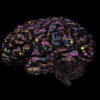Today, we are talking about the metaphysics of neuroplasticity. There are some observations that science makes, and some assumptions based on those observations. Any time you draw a conclusion you are more or less venturing into metaphysics.
The general idea regarding the brain, and its potential for change, is that you have paths or circuits in the brain and as those pathways form you learn new things, develop new opinions or behaviours and generally change or grow as a person. This summarize it pretty well so far?
There are some odds hitches to that theory. They can’t track down specific regions dedicated to memory. They can follow the pathways your physical senses take to your brain, and they can track regions that are especially active whenever you are experiencing specific sensory stimuli. They even can perhaps make an educated guess about what parts of your sensory and motor regions are responsible for what elements of your experience.
It sounds rather mechanical. Well, it gets considerably more complicated.
Just a brief sidetrack that does loosely relate to today’s subject… They have come to the conclusion that their methods for studying bacteria are inadequate. They used to treat the study of bacterial organisms like a physics problem and try to examine what particles did what. This has proven of very limited use. Each bacteria displays too much in the way of novel characteristics so they will have to begin modelling them to be able to predict how they will behave, like psychology for the bacterium.
Or quantum physics? Indeed. I ponder the relative probabilities. They have found that sort of math does a better job of letting them predict neural firing patterns than anything more concrete does.
I read last night that using an fMRI, they have seen how manipulation of a meridian point on the body (that has no known physical or nervous system connection to the brain) was able to activate a specific region of the brain that corresponded to the Chinese knowledge of our chi. Maybe they are beginning to discover the more subtle structures and patterns our ancestors intuited all along.
Another interesting discovery. Do you feel your bones have anything to do with how you think? They have found the bones act like an endocrine organ, producing a protein called osteocalcin that has nothing to do with bone health. Instead, it seems to influence the function of other organs, neurons also. Should the transmission of osteocalcin from your bones be disturbed, you will become very anxious and depressed, as well as develop insulin problems, so your skull is participating in your brain function. What do you think of this?
So, perhaps, some exercises for the bones might also increase emotional stability? Indeed, and the notion of chi transmission through the bones. Chi itself may be a very generic term, but perhaps there is scientific basis for it after all?
Your thoughts are welcome. Be well friends.
Travis Saunders
Dragon Intuitive
~science,mysticism,spirituality~



Leave a Reply